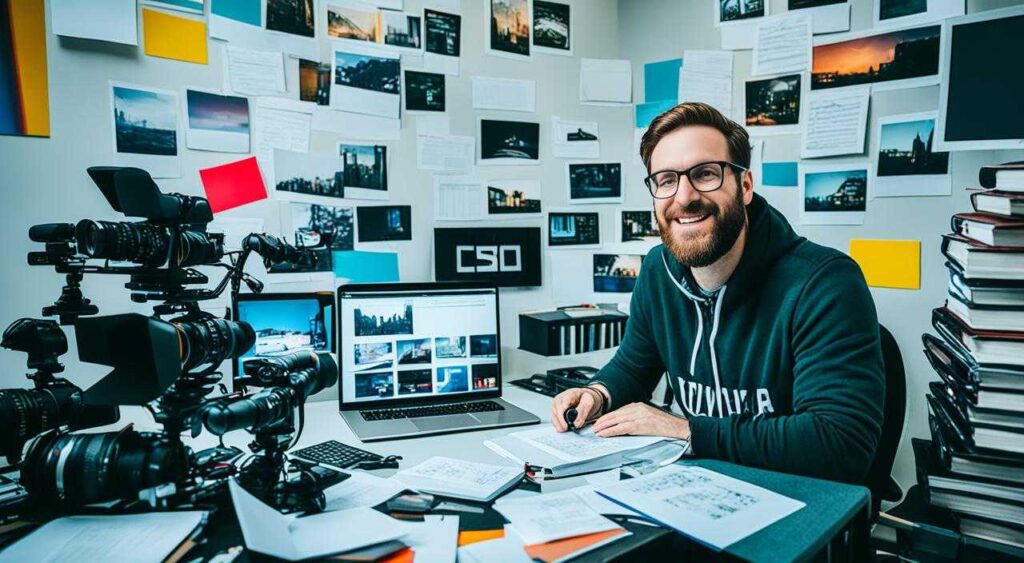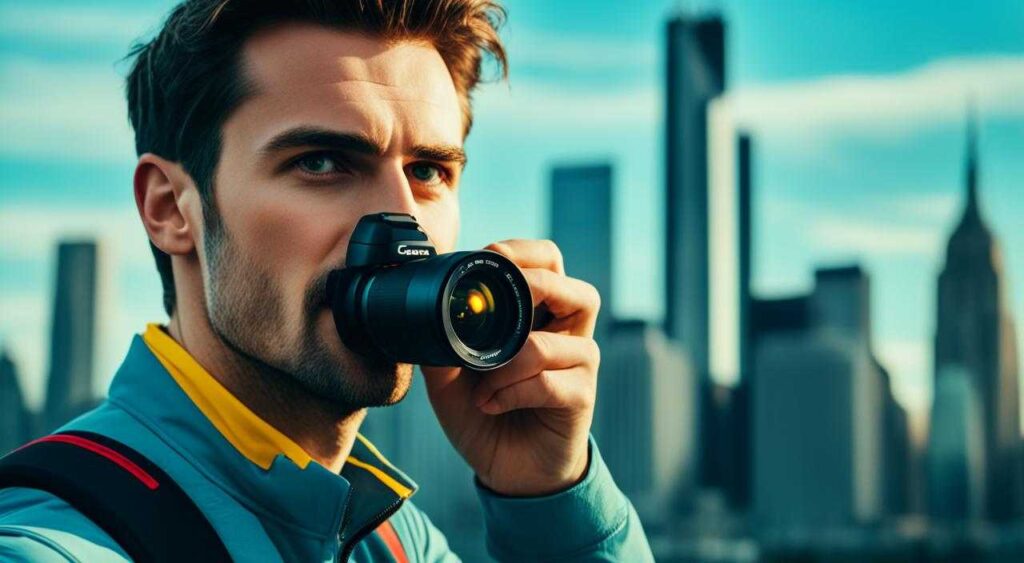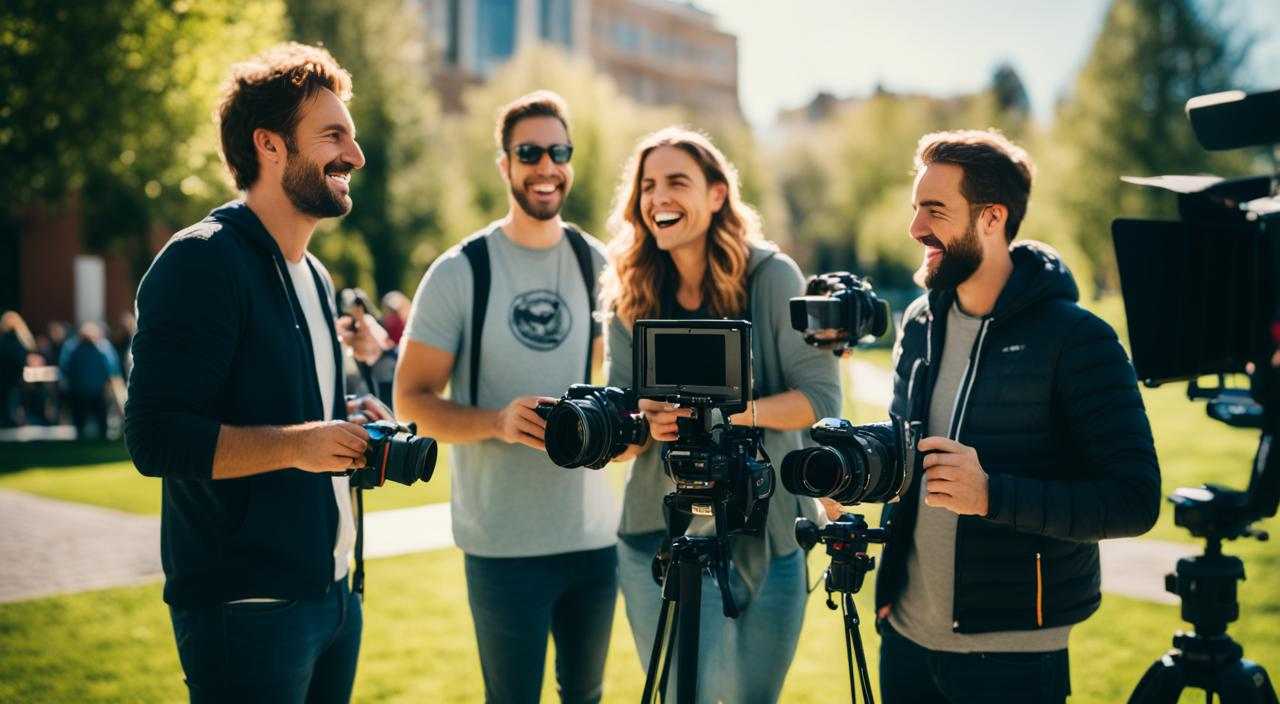Starting a career in videography without a degree might seem scary. But the world of videography is welcoming today. Anyone eager can learn videography without needing to go to school. This article shows you don’t need school to do great things. Your love for the work, creativity, and willingness to learn matter more.
There are other ways to learn outside of school. You can use online tools, and hands-on practice, and teach yourself to be great in this field. If you want to get into videography, the right knowledge and tools can help you. You can make amazing videos that people all over the world will love.
Key Takeaways
- Understanding that a formal degree is not mandatory to succeed in videography.
- Exploring the resources and platforms available for self-education in videography.
- Emphasizing the importance of passion and initiative in learning the craft of videography.
- Recognizing the role of creativity and personal drive in breaking into the videography industry.
- Identifying pathways to acquire practical experience that can substitute for formal education.
- Realizing the potential of online tools and community support in the journey to become a videographer.
The Rise of Self-Taught Videographers
Nowadays, learning is easy with just a click. This change helps self-taught videographers shine. No longer do you need school to be an expert? People can use the internet and tools to make their path in videography.
Success Stories of Self-Taught Professionals
Self-taught videographers are known for their hard work and creativity. They learn from online videos, friends, and by trying things out. This way, they make portfolios as good as those who went to school. They show that passion and hard work matter a lot.
Advantages of a Non-Traditional Path
Learning videography on your own has many benefits. You can learn anytime and follow what interests you. This way is often cheaper than going to school. You don’t pay a lot for classes. You can learn in a way that fits you best.
- Flexibility to learn outside traditional classroom hours
- Access to a vast array of resources and learning materials online
- Opportunity to build a diverse portfolio of creative works
- Cost savings on tuition and associated educational expenses
As tech gets better and more people want video content, self-taught videographers have big chances. If you’re willing to work hard and keep learning, you could be a great success story in videography.

Essential Videography Skills You Can Acquire on Your Own
Videography is both a technical skill and an art. It’s perfect for hobbyists and aspiring pros alike. You can learn a lot by practicing, trying new things, and always learning.
Technical Proficiency: Cameras, Lighting, and Software
Good videos need knowledge of cameras, lenses, and lighting. Knowing your tools is key. Plus, learning how to use editing software adds polish to your work. Tools like Adobe Premiere Pro and Final Cut Pro are great for this.
Keep up with new tech and industry trends. This keeps your skills sharp and competitive.
Artistic Skills: Composition and Storytelling
Artistic skills are just as important as technical ones. How you frame your shots tells a story. Knowing about the rule of thirds, depth of field, and perspective is crucial. Storytelling is about connecting those shots into something that moves people. A good story can touch hearts and be memorable.
Blend artistic and technical skills to make professional and engaging videos. This will open up endless creative paths for you.
Choosing the Right Equipment for Aspiring Videographers
For those interested in choosing videography equipment, knowing your choices is key. It helps make great videos. Aspiring videographers need gear that fits their budget and works well. We gathered a list of essential videography equipment for creating top videos.
When choosing cameras, look at resolution, frame rate, sensor size, and image quality. The right lens changes the video’s look and sharpness. For lights, know where you’ll film. This helps pick the best gear. We have a list below showing the best gear for both new and pro videographers.
| Equipment Type | Beginner Option | Professional Option |
|---|---|---|
| Camera | Canon EOS Rebel T7i | Canon EOS C300 Mark III |
| Lens | Sigma 18-35mm F1.8 Art DC HSM | Canon EF 24-70mm f/2.8L II USM |
| Lighting | Neewer 2 Pieces Bi-color LED Video Light | Arri SkyPanel S60-C LED Softlight |
| Microphone | Rode VideoMicro Compact On-Camera Microphone | Sennheiser MKH 416-P48U3 Super-Cardioid Shotgun Tube Condenser Microphone |
| Stabilization | Zhiyun Crane V2 3-Axis Handheld Gimbal Stabilizer | Freefly MōVI Pro Handheld Bundle |
| Editing Software | Adobe Premiere Rush | Adobe Premiere Pro |
Every piece of gear has special features for different levels. The right equipment boosts your creative power. Whether making stories or big shows, start with the best tools. Your videography adventure begins with the right equipment.
Networking and Building Your Videography Community
The power of videography networking is in sharing knowledge, resources, and support. For those who make videos, creating a community is key. It helps us stay up-to-date, find jobs, and work together.
Connecting with Industry Professionals
Being active in the videography scene is a must. You should attend workshops and online events. Also, check out LinkedIn for videography groups.
- Attend workshops to sharpen your skills and meet peers.
- Join online forums and groups focused on videography topics.
- Volunteer for videography projects to increase visibility and connections.
Leveraging Social Media for Exposure and Opportunities
Using social media is key to building a videography community today. Instagram, Vimeo, and YouTube are great for showing your work. They also let you tell stories and chat live with fans.
- Create engaging content that highlights your videography style.
- Regularly engage with your audience to build a loyal following.
- Collaborate with other videographers or influencers to expand your reach.
Staying true and consistent online helps in networking. It also attracts new clients or partners.
| Platform | Purpose | Benefits |
|---|---|---|
| Professional Networking | Builds credibility, connects with industry leaders | |
| Visual Storytelling | Enhances visibility, fosters community engagement | |
| Vimeo | High-Quality Video Sharing | Attracts a niche audience, showcases video skills |
| YouTube | Content Creation & Vlogging | Large potential reach, monetization options |
How to Showcase Your Work with a Compelling Portfolio
Making a portfolio that shows off your video work is important. It helps show what you can do and gets clients interested.
Selecting Your Top Projects: Start by picking your best projects. Pick ones that show your style and skills. They should make you proud and show your range.
Organizing Your Portfolio: After picking your work, think about how to arrange it. It’s not just about putting your best work at the start. Think about telling a story of your growth or grouping by type or theme. How you arrange it tells clients about your work approach.
Consistency and Branding: Keep a consistent theme or brand in your portfolio. This makes your work stand out. It also shows clients what to expect from you in quality and style.
Let’s look at a good example of a videography project outline in a portfolio.
| Project Title | Type of Work | Concept | Role | Outcome |
|---|---|---|---|---|
| Waves of Time | Short Film | Exploration of generational narratives | Director, Editor | Award-winning cinematography at Independent Film Festival |
| Urban Beats | Music Video | Vibrant representation of urban music culture | Cinematographer | Featured on renowned music channels |
| The Silent Wild | Documentary | Conservation efforts in the Amazon rainforest | Camera Operator, Sound Design | Used in educational programs across schools in North America |
Your portfolio does more than show your work. It displays your growth, creativity, and skill level. Remember, it’s not just about your work. It’s about showing who you are as a professional.
By using this portfolio approach, you show your technical and creative skills. You also share your brand and the unique value you add to projects.

How to Become a Videographer Without a Degree
Step into the videography world with confidence. Use self-learning and smart plans. This path of becoming a videographer without a degree is lined with steps leading to success. Here’s a guide for your journey.
Step-by-Step Guide: From Amateur to Professional
- Start by teaching yourself with online videos, workshops, and books to learn the basics.
- Get good video equipment and editing tools, focusing on quality and reliability.
- Try filming different things to build your skills and learn about various settings.
- Find your style and niche to stand out and attract the right clients.
- Make a great portfolio to show your work and your special way of filming.
- Use social media and online platforms to meet others and get noticed.
- Ask for feedback and be open to criticism to improve and meet industry norms.
- Volunteer or intern to gain real experience and make professional connections.
Key Milestones in Self-Directed Learning
Your growth thrives on self-betterment and self-directed learning. Keeping track of milestones helps you reach your goals. Here are the milestones:
| Milestone | Objective | Resources |
|---|---|---|
| 1. Mastering Camera Functions | Learn and use your camera’s features well. | Camera manuals, YouTube tutorials |
| 2. Editing Proficiency | Get good at editing to make your videos look better. | Online courses, Practice projects |
| 3. Storytelling Ability | Tell stories well in your videos. | Workshops, Film studies |
| 4. Niche Specialization | Be great at one type of videography. | Industry research, Specialized forums |
| 5. Business Acumen | Learn to manage customers, prices, and your brand. | Business books, Networking events |
No single way leads to a successful videography career. Your hard work and creativity pave the way. Follow this step-by-step guide to move up in the videography world and make your success path.
Conclusion
Starting videography without a degree is full of opportunity and flexibility. You can build a career with self-taught skills and friends.
Success comes from loving what you do. Keep learning and getting better. This will guide you in this changing field.
Many stories show this. They encourage people who want to be videographers.
Ending our talk, the path to being great at videography includes many things. Skills, making friends, and showing your work bravely. Doing videography without a degree lets you create your own story. It’s about freedom and being creative for those who dream big.
You may like:
- How to become a pilot without a degree
- How to become a recruiter without a degree
- How to become a certified counselor without a degree
- How to become a virtual assistant without a degree
- How to become a childcare worker without a degree
FAQ
Can I become a videographer without a degree?
Yes, you don’t need a degree to start a videography career. The right strategies and hard work help you succeed.
Are there success stories of self-taught videographers?
Yes! Many videographers learned on their own and became successful. We’ll share some of their stories.
What are the advantages of choosing a non-traditional path in videography?
Going the non-traditional way offers flexibility and saves money. It also allows you to learn in your style. We’ll talk more about these benefits.
What essential skills do I need to acquire for videography?
Learning how to use cameras and lights is key. So is knowing video editing software.
Having skills like composition and storytelling helps make your videos stand out.
How do I choose the right equipment for videography?
Choosing the best cameras, lenses, and lights is important. We’ll help you find what works best for you and your projects.
How do I build a network in the videography industry?
Making connections is important in videography. We’ll show you how to meet professionals, join events, and use social media to grow your career.
How can I showcase my work effectively with a videography portfolio?
A great portfolio draws clients to you. We’ll guide you in making a portfolio that shows off your best work attractively.
How can I become a videographer without a degree?
We’ll guide you through becoming a videographer step by step, without having a degree. You’ll learn about gaining skills, making a portfolio, and building a reputation to turn pro.
